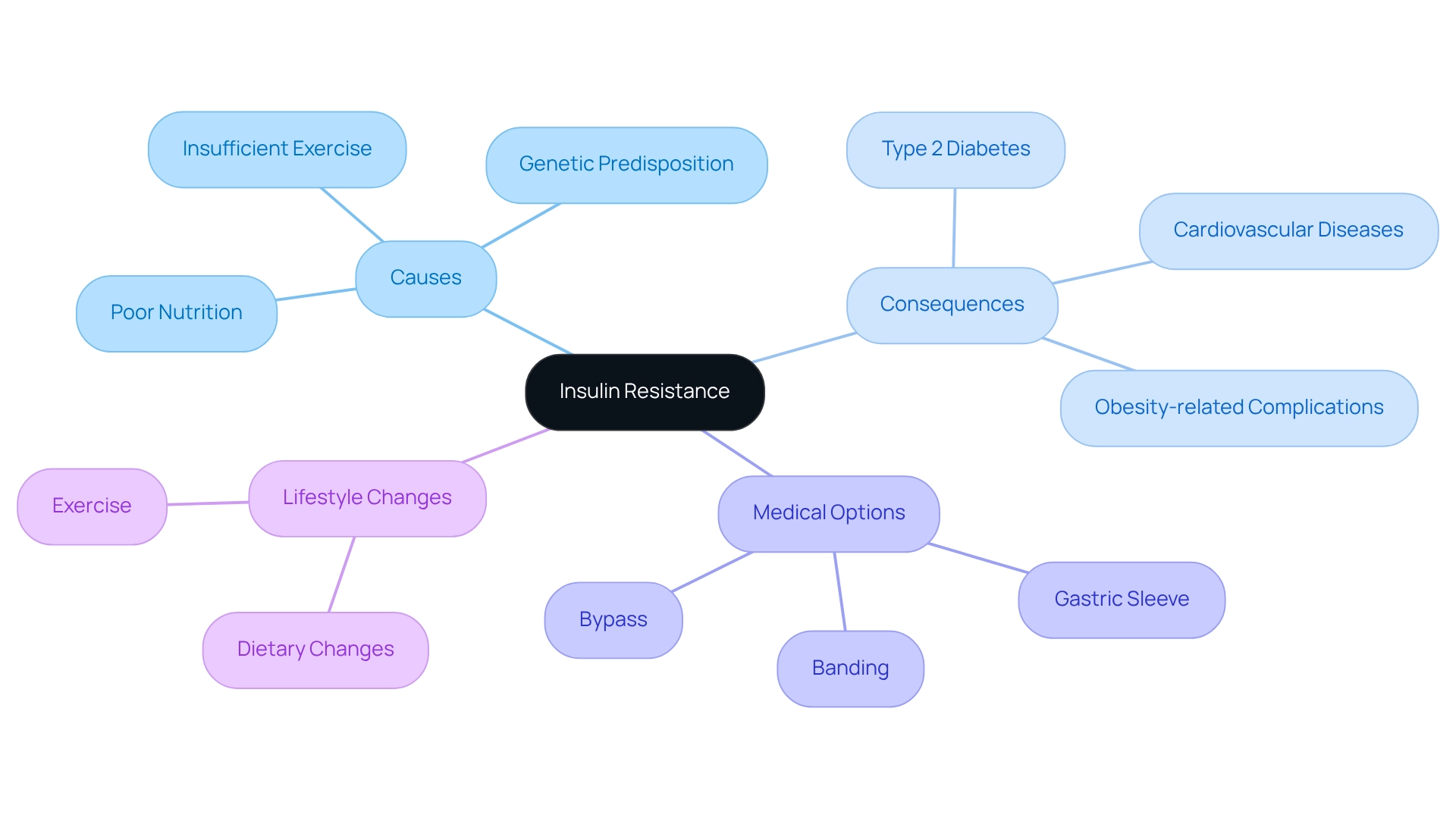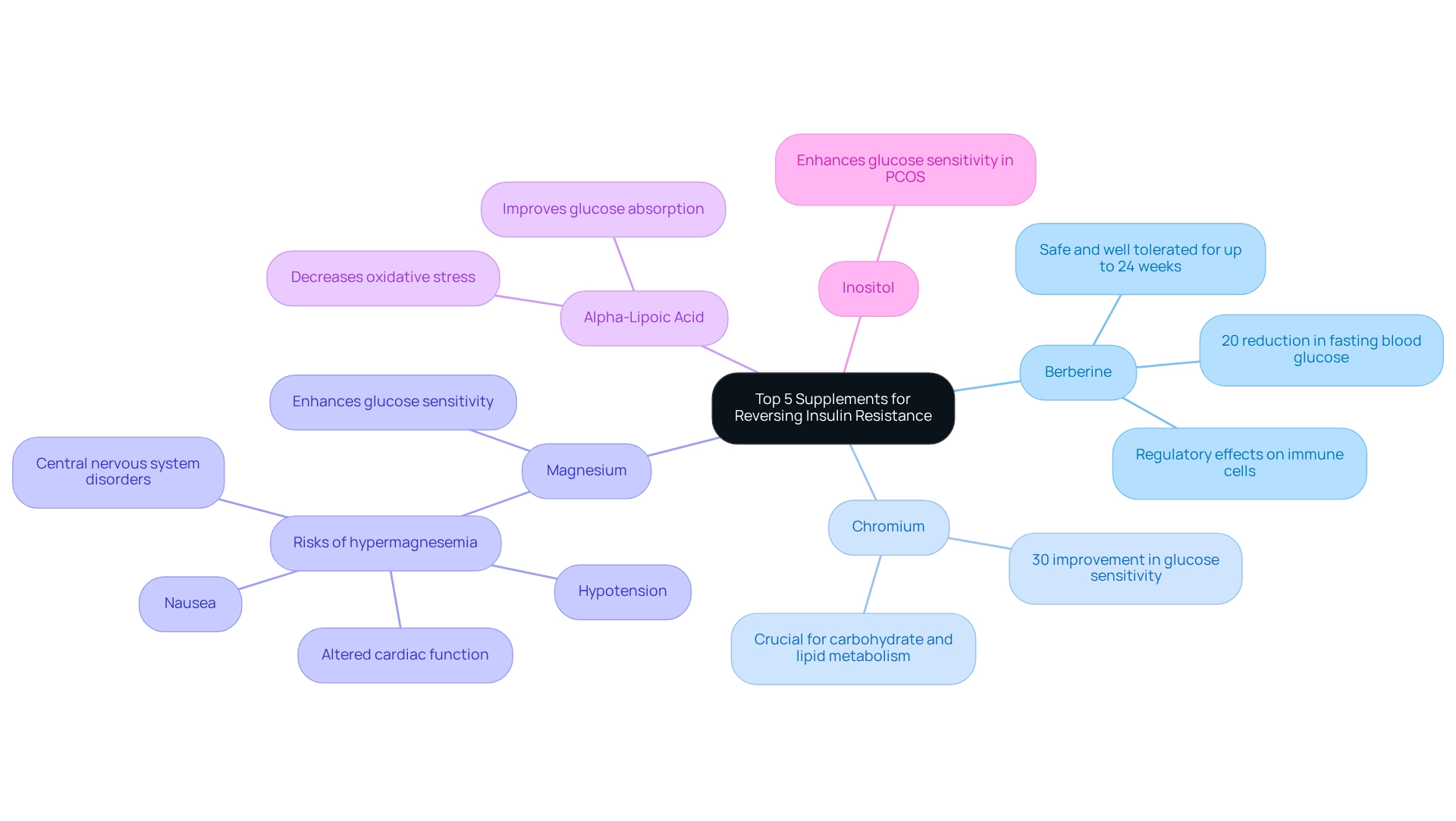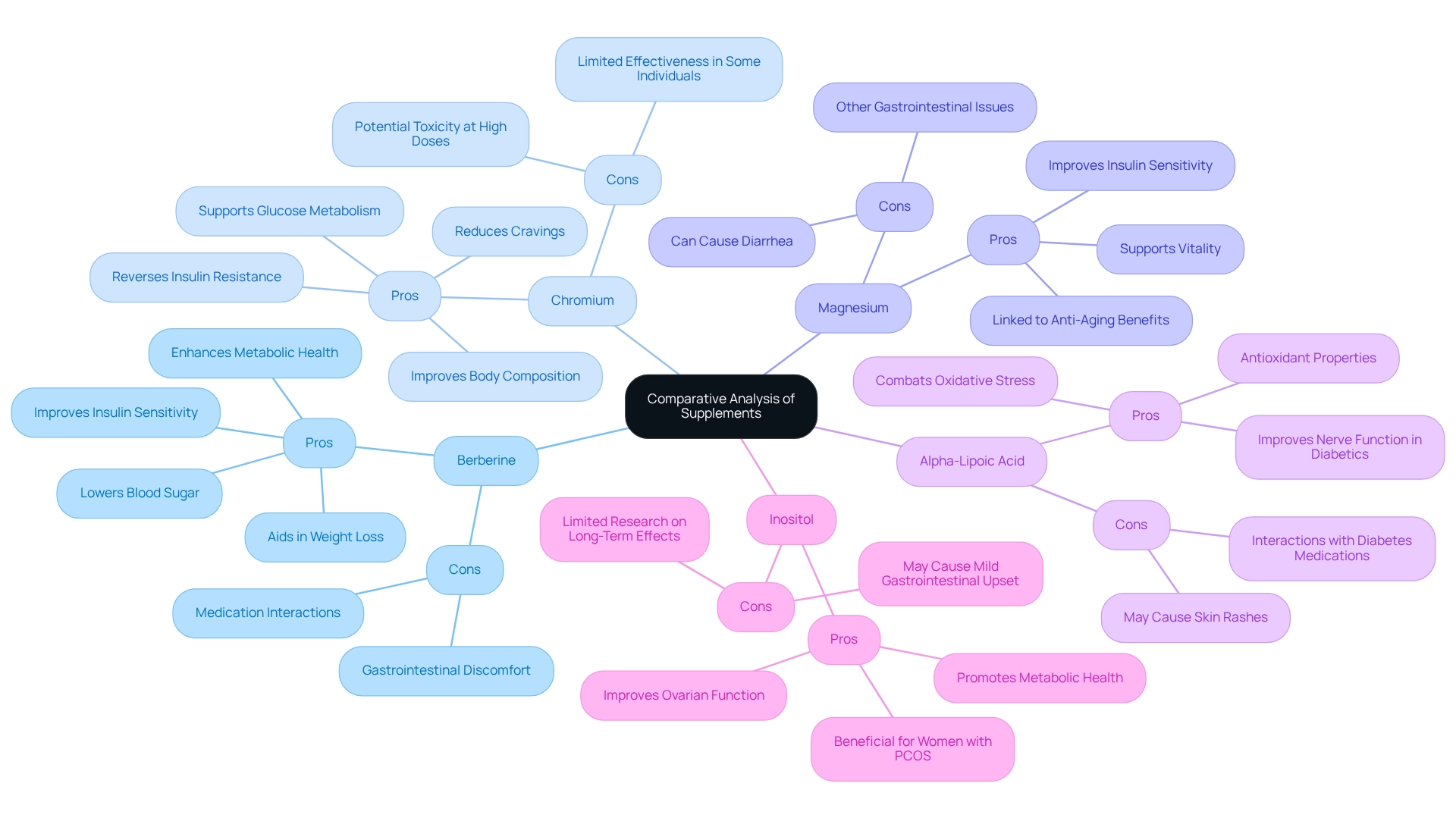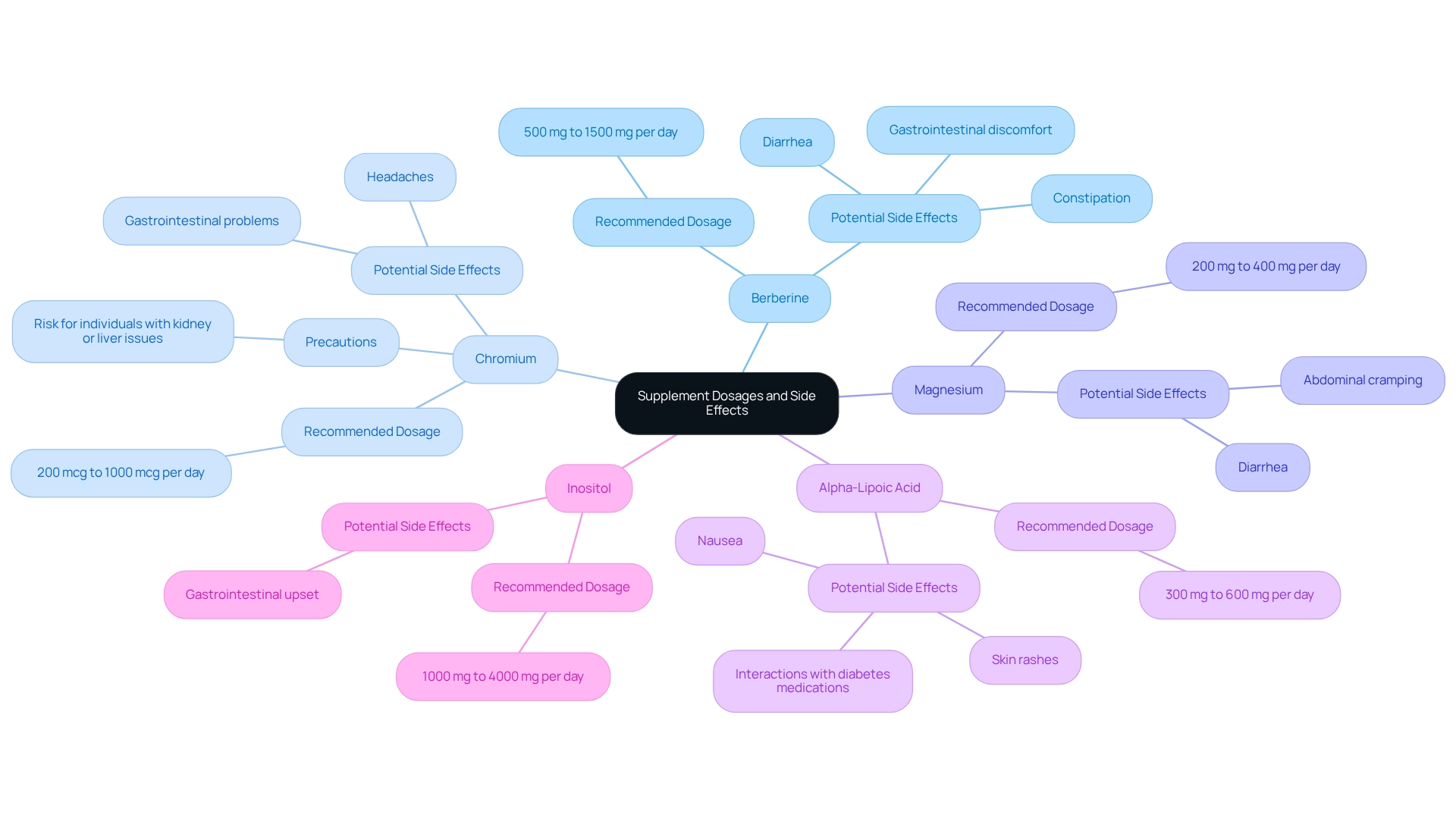5 Supplements to Reverse Insulin Resistance: Pros and Cons
Overview
This article explores five noteworthy supplements—berberine, chromium, magnesium, alpha-lipoic acid, and inositol—that may aid in reversing insulin resistance. Each supplement comes with its unique set of benefits and drawbacks. Evidence supporting their effectiveness in enhancing glucose sensitivity is presented, while potential side effects are also highlighted. Importantly, the article emphasizes the necessity of consulting healthcare professionals before incorporating these supplements into your regimen. This balanced perspective offers valuable insights into their role in managing insulin resistance.
Introduction
In a world where metabolic health faces increasing threats, understanding insulin resistance has become essential for safeguarding well-being. This condition, defined by the body’s reduced response to insulin, can result in serious health complications, including type 2 diabetes and cardiovascular diseases.
Factors such as diet, exercise, and genetics significantly contribute to its development, making awareness and proactive management vital. With a rising interest in dietary supplements as potential interventions, individuals now have various options to consider for reversing insulin resistance.
This article explores the top supplements available, evaluates their effectiveness, and provides practical guidance on their use, empowering readers to take informed steps toward enhancing their metabolic health.
Understanding Insulin Resistance and Its Impact on Health
A metabolic condition arises when the body’s cells become less responsive to a hormone crucial for regulating blood sugar levels. This condition can result in elevated blood glucose levels, which increases the risk of type 2 diabetes, cardiovascular diseases, and obesity-related complications. Factors contributing to glucose intolerance include:
- Poor nutrition
- Insufficient exercise
- Genetic predisposition
Understanding these elements is vital for individuals looking to enhance their metabolic health and explore effective measures, such as supplements to reverse insulin resistance and improve overall wellness.
Recent statistics indicate that surgical procedures, such as gastric sleeves, banding, and bypass, are available for eligible individuals with obesity, a significant factor in glucose metabolism issues. This underscores the importance of considering medical options alongside lifestyle changes.
Moreover, recognizing the clinical signs and symptoms associated with glucose intolerance is essential for early diagnosis and intervention, especially since there is currently no definitive clinical test for this condition. The case study titled “Clinical Recognition of Insulin Resistance” highlights that identifying these signs can facilitate timely action.
Experts emphasize that addressing glucose intolerance through lifestyle adjustments, such as dietary changes and exercise, is crucial for improving metabolic well-being. As Pankaj Arora, M.D., points out, neglecting to implement effective preventive strategies for young adults at risk could lead to serious cardiovascular events later in life. By understanding the causes and consequences of glucose intolerance, individuals can take proactive steps to enhance their well-being and mitigate health risks.

Overview of the Top 5 Supplements for Reversing Insulin Resistance
Recent studies emphasize various supplements that can effectively counteract glucose intolerance.
- Berberine is a natural substance obtained from different plants that has shown considerable enhancements in glucose sensitivity and decreases in blood sugar levels. Research suggests that berberine’s diverse regulatory impacts on immune cells might also play a role in its effectiveness in managing blood sugar challenges. Notably, studies show that berberine can lead to a 20% reduction in fasting blood glucose levels. Furthermore, Joseph E. Blais from the School of Public Health at The University of Hong Kong noted that “berberine appeared to be safe and well tolerated by trial participants when taken for up to 24 weeks.”
- Chromium, a trace mineral, is crucial for carbohydrate and lipid metabolism. Evidence indicates that chromium supplementation can improve glucose regulation, with some studies reporting a significant rise in sensitivity among participants, with enhancements of up to 30%.
- Magnesium is vital for numerous biochemical processes. A lack of magnesium has been associated with glucose intolerance, and supplementation may enhance glucose sensitivity. However, it is important to note that hypermagnesemia can lead to hypotension, nausea, altered cardiac function, and central nervous system disorders.
- Alpha-Lipoic Acid is recognized for its antioxidant characteristics and may improve glucose absorption while decreasing oxidative stress in individuals with compromised glucose regulation. This makes it a beneficial component of metabolic health approaches.
- Inositol, especially myo-inositol, has demonstrated potential in enhancing glucose sensitivity, particularly in women with polycystic ovary syndrome (PCOS). Each of these supplements functions through unique processes, collectively aiding in enhanced metabolic well-being and improved management of glucose resistance.
Additionally, a case study titled “Synergistic Actions of BBR in Autoimmune Disease” suggests that berberine’s multifaceted regulatory effects on immune cells may provide a more effective approach to managing complex autoimmune diseases, further highlighting its potential health benefits.

Comparative Analysis of Effectiveness: Pros and Cons of Each Supplement
-
Berberine:
- Pros: Berberine is effective in lowering blood sugar and improving insulin sensitivity, and it may aid in weight loss. Studies suggest its function in enhancing metabolic health, making it a favored option for individuals dealing with glucose intolerance. It is available in various forms, including capsules and powders.
- Cons: However, it can cause gastrointestinal discomfort and may interact with certain medications.
-
Chromium:
- Pros: Chromium supports glucose metabolism and may help reduce cravings while improving body composition. Scientific research indicates that chromium is one of the supplements to reverse insulin resistance, enhancing sensitivity to insulin, particularly in those with resistance. It is commonly found in supplements as capsules and tablets.
- Cons: On the downside, its effectiveness may be limited in some individuals, and there is potential for toxicity at high doses.
-
Magnesium:
- Pros: Magnesium is essential for numerous bodily functions, and supplementation can improve insulin sensitivity, especially in those who are deficient. It is linked to various anti-aging benefits, supporting overall vitality. Available forms include tablets, powders, and liquids.
- Cons: Excessive intake can lead to diarrhea and other gastrointestinal issues.
-
Alpha-Lipoic Acid:
- Pros: Known for its antioxidant properties, alpha-lipoic acid may improve nerve function in diabetic patients. Its role in combating oxidative stress is particularly beneficial for aging individuals. Typically, it is found in capsule form.
- Cons: It may cause skin rashes and can interact with diabetes medications.
-
Inositol:
- Pros: Inositol is particularly beneficial for women with PCOS, potentially improving ovarian function and insulin sensitivity. Emerging research suggests its role in promoting metabolic health and longevity. It is available in both powder and capsule forms.
- Cons: Nonetheless, there is limited research on its long-term effects, and it may cause mild gastrointestinal upset.
This comparative analysis highlights the unique benefits and potential drawbacks of each supplement. It serves to guide readers in their choices while emphasizing the importance of evidence-based insights in managing insulin resistance and recommending supplements to reverse insulin resistance to support anti-aging efforts.

Practical Considerations: Dosage, Side Effects, and Recommendations
Berberine
The recommended dosage typically ranges from 500 mg to 1500 mg per day, divided into two or three doses. Users may encounter adverse reactions such as gastrointestinal discomfort, diarrhea, and constipation.
Chromium
Common dosages fall between 200 mcg and 1000 mcg per day. Adverse reactions may involve headaches and gastrointestinal problems, especially at increased doses. People with prior kidney or liver issues should be careful, as negative outcomes may be intensified.
Magnesium
The recommended daily allowance varies by age and sex, with common supplemental doses ranging from 200 mg to 400 mg. Possible adverse reactions include diarrhea and abdominal cramping, especially with larger amounts.
Alpha-Lipoic Acid
Typical dosages range from 300 mg to 600 mg per day. Adverse reactions may involve nausea, skin rashes, and potential interactions with diabetes medications, requiring careful monitoring.
Inositol
Recommended dosages generally vary, with common ranges between 1000 mg and 4000 mg per day. Side effects are typically mild, including gastrointestinal upset.
Consultation with healthcare professionals is essential before initiating any new supplement regimen, especially for individuals with existing health conditions or those taking other medications.

Conclusion
Increasing awareness and understanding of insulin resistance is crucial for maintaining metabolic health in today’s world. This condition, characterized by the body’s diminished response to insulin, can lead to serious health issues such as type 2 diabetes and cardiovascular diseases. A combination of lifestyle factors, including diet and exercise, plays a significant role in the development of insulin resistance, underscoring the need for proactive management through informed choices.
Exploring dietary supplements offers a promising avenue for reversing insulin resistance. Key supplements such as:
- berberine
- chromium
- magnesium
- alpha-lipoic acid
- inositol
have demonstrated effectiveness in enhancing insulin sensitivity and improving metabolic health. Each supplement presents unique benefits and potential drawbacks, making it essential for individuals to consider their specific health needs and consult healthcare professionals before starting any new regimen.
In conclusion, addressing insulin resistance through lifestyle changes and appropriate supplementation is vital for safeguarding long-term health. By understanding the mechanisms behind these supplements and their roles in metabolic health, individuals can take empowered steps toward reversing insulin resistance and improving their overall well-being. Prioritizing metabolic health today will pave the way for a healthier tomorrow, reducing the risks associated with chronic diseases and enhancing quality of life.
Frequently Asked Questions
What is insulin resistance?
Insulin resistance is a metabolic condition where the body’s cells become less responsive to insulin, a hormone crucial for regulating blood sugar levels. This can lead to elevated blood glucose levels.
What are the health risks associated with insulin resistance?
Insulin resistance increases the risk of type 2 diabetes, cardiovascular diseases, and obesity-related complications.
What factors contribute to glucose intolerance?
Factors contributing to glucose intolerance include poor nutrition, insufficient exercise, and genetic predisposition.
How can individuals enhance their metabolic health?
Individuals can enhance their metabolic health by understanding the factors affecting insulin resistance and exploring effective measures such as dietary changes, exercise, and possibly supplements.
What medical options are available for individuals with obesity related to glucose metabolism issues?
Surgical procedures such as gastric sleeves, banding, and bypass are available for eligible individuals with obesity, which is a significant factor in glucose metabolism issues.
Why is it important to recognize the signs and symptoms of glucose intolerance?
Recognizing the signs and symptoms of glucose intolerance is essential for early diagnosis and intervention, as there is currently no definitive clinical test for this condition.
What does the case study ‘Clinical Recognition of Insulin Resistance’ emphasize?
The case study emphasizes that identifying the signs of insulin resistance can facilitate timely action for better health outcomes.
What lifestyle adjustments can help address glucose intolerance?
Lifestyle adjustments such as dietary changes and increased physical activity are crucial for improving metabolic well-being and addressing glucose intolerance.
Why is it important for young adults at risk to implement preventive strategies?
Implementing effective preventive strategies for young adults at risk is important to avoid serious cardiovascular events later in life, as emphasized by experts like Pankaj Arora, M.D.


